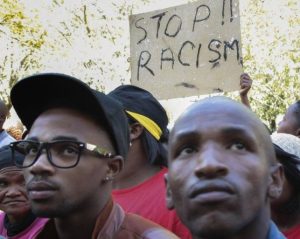UN group calls out racism in South Africa
Rising xenophobia, racism and hate speech in South Africa that is aimed at migrants, refugees, asylum seekers has drawn criticism from a group of UN human rights experts.
The group of UN Special Rapporteurs warned that the ongoing xenophobic mobilisation is getting broader and deeper and has become the central campaign strategy for some political parties in the country.
The group says there is a risk of “explosive violence”.
“Anti-migrant discourse from senior government officials has fanned the flames of violence, and government actors have failed to prevent further violence or hold perpetrators accountable,” the group said in a statement.
“Without urgent action from the government of South Africa to curb the scapegoating of migrants and refugees, and the widespread violence and intimidation against these groups, we are deeply concerned that the country is on the precipice of explosive violence,” they said.
The statement specifically mentioned “Operation Dudula” as an example of hate speech.
Originally a social media campaign, “Operation Dudula” has become an umbrella for the mobilisation of violent protests, vigilante violence, arson targeting migrant-owned homes and businesses, and even the murder of foreign nationals.
 The experts said at xenophobia, especially against low-income, African and Southeast Asian migrants and refugees, had been a feature of South African politics for many years.
The experts said at xenophobia, especially against low-income, African and Southeast Asian migrants and refugees, had been a feature of South African politics for many years.
In 2008, for example, xenophobic violence resulted in the death of over 60 people and contributed to the displacement of at least 100,000.
The group said xenophobia is often explicitly racialised, targeting low-income black migrants and refugees and, in some cases, South African citizens accused of being “too black to be South African”.
The UN experts also said that discrimination against foreign nationals in South Africa has been institutionalised both in government policy and broader South African society.
This had led to attacks and deaths among migrants, as well as rights to an adequate standard of living and to the highest attainable standard of health. There are also elevated risks of arbitrary detention, torture and refoulement, the group said.
It also expressed concern over reports that widespread corruption in the South African asylum and migration systems had compounded these problems.
“The cost in human dignity and lives, particularly in light of the past 30 years of xenophobic violence, remains widespread and deeply troubling,” the experts said.
“We are gravely concerned that South Africa is not meeting its positive obligations to protect and promote human rights while preventing racial and xenophobic discrimination,” they said.
“At the same time, perpetrators enjoy widespread impunity for xenophobic rhetoric and violence, leading to a lack of accountability for serious human rights violations and the flourishing of racist and xenophobic political platforms.”
The experts urged private and public actors to honour their commitments to human rights and racial justice, and take a stand against the racist and xenophobic violence which continues in South Africa.












